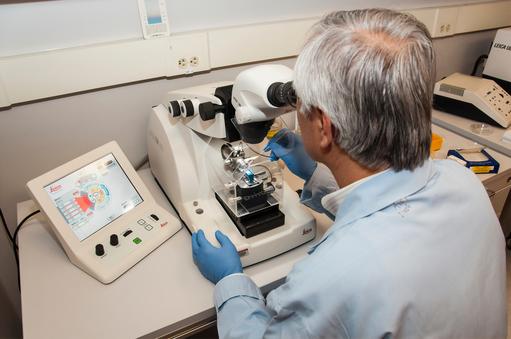Directory

Mark Emberton
Honorary Consultant UrologistMark Emberton is Professor of Interventional Oncology in the Division of Surgery and Interventional Science at University College London (UCL). He is also the Clinical Director of the Clinical Effectiveness Unit at the Royal College of Surgeons of England, a Consultant in Urological Oncology at the University College London Hospital, and a member of the Partners’ Council of the National Institute of Clinical Excellence (NICE).
Mark is a world-class expert in prostate cancer who lectures in premier medical institutions throughout the world, and has published more that 200 research papers in peer reviewed journals. He has interests in the design and development of clinical studies, and innovative projects aimed at improving the diagnostic and therapeutic pathways for men with prostate cancer, principally through the use of novel imaging techniques and minimally invasive therapies. Mark leads a research team of clinical innovators that combine knowhow and experience in bioengineering and nanotechnology, and regularly carries out clinical studies aimed at enhancing cancer therapies.
view this profile
Directory:
Tags:

|
Prostate cancer develops in the walnut-sized gland underneath the male bladder. It is the most common cancer, other than skin cancer and is the second leading cause of cancer-related death in men.
The disease, which often develops slowly, is different to most other cancers because small areas of cancer within the prostate are common, especially in older men and may not grow or cause any problems. This presents men diagnosed with prostate cancer with some extremely difficult choices. The statistics Prostate cancer is the second most frequently diagnosed cancer in men and the fifth most common cancer overall. One in six men will be diagnosed with the disease in their lifetime and the overwhelming majority of cases occur in wealthy countries. Each year, about 37,000 men in the UK and some 210,000 men in the US are diagnosed with prostate cancer and more than 10,000 and 28,000 respectively die each year of the disease. In the US there are over two million men living with the disease and African American men have a higher incidence of prostate cancer and double the mortality rate compared with other racial and ethnic groups. In the US about US$10 billion is spent annually on treatments for the disease. Standard treatments Traditional treatments to stop the spread of prostate cancer involve surgery and radiotherapy, which has significant side effects. Following such treatments 50% of patients experience impotence, up to 20% suffer incontinence and between one and five percent who receive radiotherapy experience pain and bleeding. |
|
|
This has four arms which hold the operating instruments and the camera. These follow the commands of the surgeon. Supporting surgical team members assist in installing the proper instruments, prepare the 1-cm ports in the patient, as well as supervise the laparoscopic arms and tools being utilized.
Why is it better for the surgeon?
With its 3-D view, the da Vinci Surgical System aids the surgeon to more easily identify vital anatomy such as the delicate nerves and blood vessels surrounding specific anatomy
The EndoWrist® Instruments provide the surgeon with the dexterity not available using conventional laparoscopic instruments to perform a delicate and precise surgical dissection, reconstruction or removal of specific tissue.
The benefits of this minimally invasive surgery are significant to patients.
- Reduced trauma to the body
- Less blood loss and need for transfusions
- Less post-operative pain and discomfort
- Minimal need for pain killers
- Shorter hospital stay





